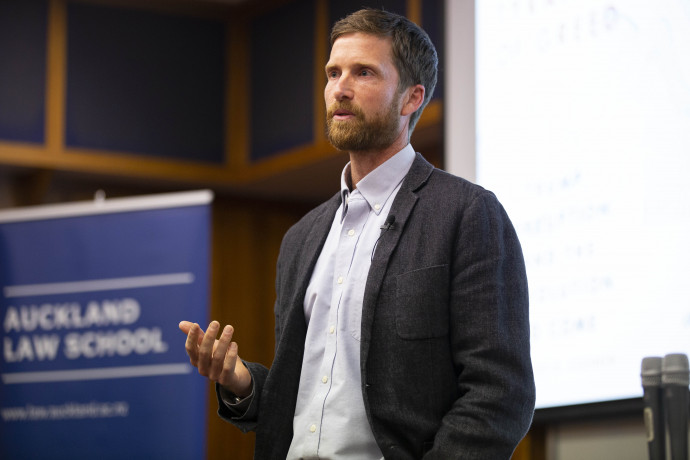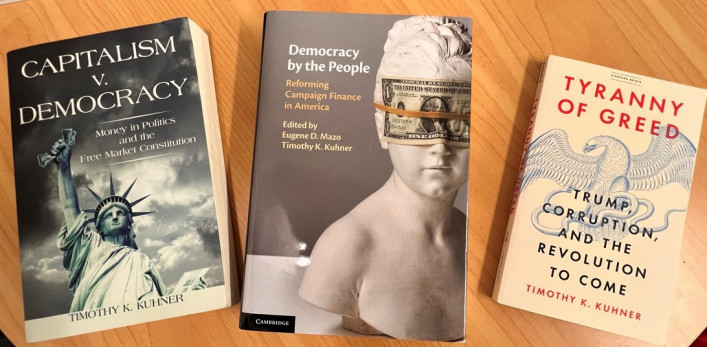Research
Published 17 August 2023A constitutional moment for liberal democracies, including Aotearoa New Zealand

Associate Professor Timothy K. Kuhner at Waipapa Taumata Rau The University of Auckland received a Marsden Fund grant to explore the need for systemic changes to the democratic form of government.
Utilising the tools of law and political economy, Kuhner’s project draws attention to the great “unfinished task” of democracies around the globe: the abolition of class government and the constitutional entrenchment of real democracy.
Many people in “first world” or “developed nations” have long believed that they live under democratic forms of government thanks to such obvious and conspicuous components as elections, free speech, competition between political parties, the rule of law, and the free press. Perhaps the greatest illusion arose towards the end of the twentieth century, when civil rights and social justice movements across the continents coincided with the end of the Cold War. Once everyone could vote and run for public office and could not be excluded from political participation on account of race, sex, gender, religion, ethnicity, or property ownership (or lack thereof), the existence of democracy truly seemed self-evident.
“The illusion rests on two powerful and generally valid premises”, Kuhner states. First, early to middle-aged democracies are credited with defeating such unjust forms of government as absolute monarchy, theocracy, and dictatorship. Second, all advanced democracies, old and new alike, can point to the success of social movements that achieved political inclusion for women and minorities. Kuhner adds, “the trouble is that both of those premises are incomplete--those were not the only unjust forms of government nor were those the only groups of people who were politically excluded.”
Kuhner’s project examines political donations, political transparency, lobbying, conflicts of interest, and the ethics of public service as an area of inquiry under the rubrics of “systemic corruption and democratic integrity”. His findings to date suggest that most democracies, even the so-called advanced liberal democracies, are performing quite poorly in these areas of law and policy. The effect is that political access and influence are generally a function of wealth. As the United Nations Development Program and Transparency International both suggested in 2019, the undue influence of concentrated wealth has become a powerful form of corruption affecting all democracies worldwide. “There’s something major that most voters and most political parties haven’t really owned up to,” Kuhner says. “After transcending government by monarchies and aristocracies, and government by religious elites and military strongmen, liberal democracies ended up enthroning government by and for the wealthy. Economic elites and financial markets have acquired the kind of political power once reserved for royal bloodlines, popes and priests, and charismatic authoritarians. After transcending—or working hard to transcend—political exclusion on the basis of race, sex, ethnicity and the like, we have succumbed to a regime of political exclusion on the basis of socio-economic status.”
Kuhner acknowledges that these might sound like radical claims, but his research aims to prove that they are well justified by a new consensus in the fields of economics, political science, and social psychology. “It’s a fascinating and urgent time to study democratic integrity globally and here in Aotearoa New Zealand,” he remarks. “Globally, democracies are struggling with the failure to mitigate climate change amidst political donations and unrestrained lobbying by fossil fuels companies and climate change denial campaigns funded by their owners and foundations. Democracies are struggling with extreme levels of economic inequality and political cynicism at a time when most public officeholders are much wealthier than average citizens and most financing for campaigns and political parties comes from a tiny sliver of the economic elite. And now New Zealand itself, ostensibly the least corrupt country in the world, has been embroiled in political donations scandals involving most of the major parties and continues to feature an unregulated system of political lobbying in which paid intermediaries offer their ‘political relationships’ for sale.”

Published works by Timothy K. Kuhner. Image: Supplied
Surveying numerous bodies of law, Kuhner’s research suggests that serious efforts to address these states of affairs are the next step in the evolution of democratic government. “Democracy is unfinished,” he claims. “People seem surprised by the international crisis in the legitimacy of the democratic form of government and by the emergence of so many existential threats. What I aim to prove is that these outcomes are entirely natural and foreseeable in light of the democratic form of government’s enduring vulnerabilities to systemic corruption. But the most important thing is that a solution is finally obtainable at this stage of history. Democracy has come so far, perhaps it’s capable of taking another major step.”
In New Zealand, the Independent Electoral Review has issued its interim report calling for major changes to political financing. Similarly, systemic changes to the laws of democracy are on the table in many leading democracies around the world. “The difficulty is that political elites came to power through the old system and sense a threat to their power”, Kuhner notes, “and the general public often has limited energy and attention span for complex topics in the law of democracy. But I’m confident that research has an important role to play in galvanizing political will for systemic change inside and outside of the political establishment. The issues that people care about most, from inequality and the cost of living to the existential threat of climate change, simply cannot be dealt with in the absence of democratic integrity. Democracy must take an evolutionary leap this century. There’s no way around it.”
RESEARCHER
Associate Professor Timothy K. Kuhner
ORGANISATION
Waipapa Taumata Rau The University of Auckland
FUNDING SUPPORT
Marsden Fund
CONTRACT OR PROJECT ID
UOA2118
